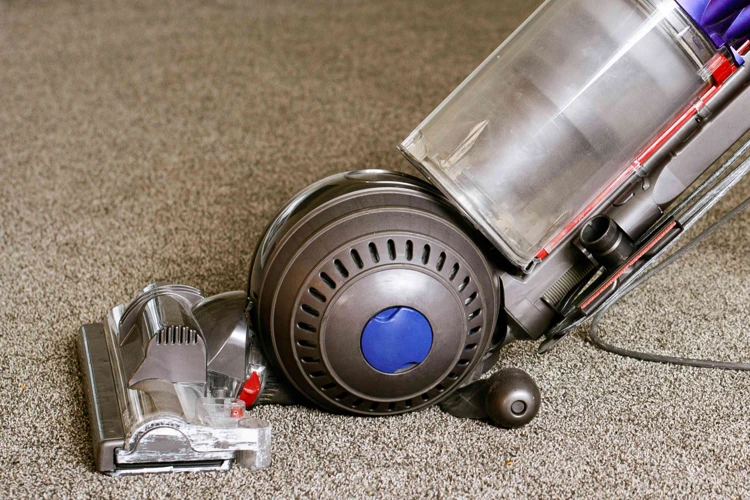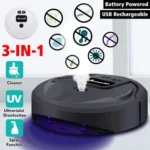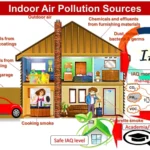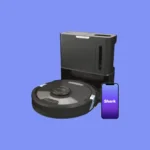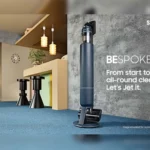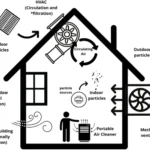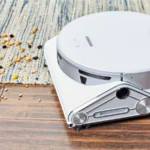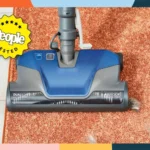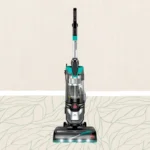Have you ever wondered how your vacuum cleaner is able to remove all the dust and allergens from your floors and carpets? One of the key technologies that make this possible is High Efficiency Particulate Air (HEPA) filtration. HEPA filtration is an essential tool for improving indoor air quality, and when combined with smart technology, it can make a significant difference in your overall health and well-being. But how does HEPA filtration work, and what makes smart vacuum cleaners different? Let’s explore the science behind HEPA filtration in smart vacuum cleaners and how it can benefit you and your family.
What is HEPA Filtration?
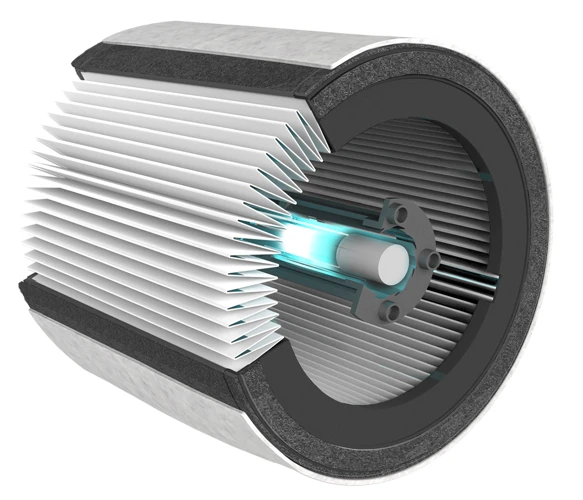
Are you aware of the role that air filtration plays in maintaining high indoor air quality? HEPA filtration is a well-known technology that has become incredibly popular in recent years for its ability to trap tiny airborne particles that can cause allergies and other health problems. But what is HEPA filtration, and how does it work? In this section, we will explore everything there is to know about HEPA filtration and its importance in maintaining healthy indoor air quality. If you’re interested in learning more about the benefits of HEPA filtration, you can read our article on HEPA Filtration and its Impact on Home Air Quality.
How HEPA Works
HEPA filtration is a specialized air filtration technology that is designed to capture very small particles that may be present in the air. The technology behind HEPA filtration is actually quite simple, but incredibly effective.
The HEPA filter is made up of a densely packed layer of very small fibers. These fibers are typically made from materials like fiberglass or other synthetic materials. The fibers in the filter are extremely fine, and are designed to trap particles that are as small as 0.3 microns in size. This includes particles like dust, pollen, pet dander, and even bacteria.
When air is drawn into a vacuum cleaner that contains a HEPA filter, the air is forced through the layers of fiber in the filter. As the air passes through the filter, the particles that are present in the air become trapped in the fibers. This allows the air that is released from the vacuum cleaner to be much cleaner than the air that was originally drawn in.
One of the key benefits of HEPA filtration is that it can help to reduce the presence of allergens and other pollutants in the air. This is especially important for people who suffer from allergies or asthma, as it can help to reduce the symptoms that they experience.
While HEPA filtration is an incredibly effective technology, there are some limitations to its use. For example, HEPA filters may need to be replaced periodically in order to maintain their effectiveness. Additionally, some HEPA filters can be quite expensive.
The technology behind HEPA filtration is incredibly effective at capturing small particles in the air. This makes it an ideal technology for use in vacuum cleaners and other applications where clean air is important. If you want to learn more about the benefits of HEPA filtration in smart vacuum cleaners, you can check out our article on benefits of smart HEPA vacuums.
Benefits of HEPA Filtration
HEPA filtration has several benefits that make it a popular choice for vacuum cleaners.
1. Effectively traps small particles: One of the main benefits of HEPA filtration is that it can efficiently capture small particles. HEPA filters can trap particles as small as 0.3 microns with an efficiency rate of 99.97%. This includes pet dander, dust mites, pollen, and other allergens that might be missed by regular filters.
2. Improves indoor air quality: Since HEPA filters capture small particles effectively, they can help improve the quality of indoor air. By removing allergens and other pollutants, HEPA filters can alleviate allergy and asthma symptoms, which is particularly important for people who spend a significant amount of time indoors.
3. Reduces air pollution: HEPA filtration can also contribute to reducing air pollution. By capturing pollutants such as smoke, dust, and volatile organic compounds (VOCs), HEPA filters can help improve the quality of outdoor air in areas close to busy roads or densely populated urban areas.
4. Cost-effective: Despite their high efficiency and advanced technology, HEPA filters do not come at a high cost. They can be easily integrated into smart vacuum cleaners without significantly increasing their overall cost, making them an affordable option for households.
5. Eco-friendly: HEPA filters are environmentally friendly and can last for several months or even years with proper maintenance. They can be removed, cleaned, and reused, making them less wasteful compared to other filters that have to be replaced frequently.
These benefits make HEPA filtration a popular choice for households aiming to improve their indoor air quality and reduce air pollution. Regular maintenance of smart vacuums and their HEPA filters is recommended to ensure their maximum efficiency. For more information about maintenance, visit our article on ‘Smart Vacuum HEPA Filter Maintenance‘.
Limitations of HEPA Filtration
While HEPA filtration offers exceptional benefits in air filtration, it does have some limitations. It’s necessary to be aware of these limitations to make informed decisions when purchasing a vacuum cleaner with a HEPA filter. Some limitations include:
- Restriction in airflow: HEPA filters are dense and trap particles as small as 0.3 microns, so air flow can be restricted. This can lead to decreased suction power in some vacuum cleaners.
- Expensive: A HEPA filter is more expensive than standard filters, making these filters more costly to replace.
- Regular maintenance: To maintain its effectiveness, HEPA filters must be cleaned and/or replaced regularly according to the manufacturer’s instructions. The cost of regular maintenance can be higher with vacuum cleaners that have a HEPA filter.
- Not suitable for all vacuums: Some vacuum cleaners may not be designed to work with a HEPA filter. In such cases, the vacuum cleaner may not be able to push enough air through the filter, leading to decreased performance and airflow.
It’s important to note that while these limitations exist, the benefits of HEPA filtration still significantly outweigh the drawbacks. When buying a smart vacuum cleaner with HEPA filtration, it’s important to understand the limitation of the HEPA filtration, and weigh them against the advantages of the technology to determine if it would be a good fit for you.
Link: /hepa-filtration-vs-standard-filtration/
What Makes Smart Vacuum Cleaners Different?

Smart vacuum cleaners have revolutionized the way we clean our homes by implementing advanced technology to make cleaning more efficient and effective. But what sets them apart from traditional vacuum cleaners? One of the main factors is their use of HEPA filtration technology, which is crucial for those who suffer from allergies or respiratory issues. In this section, we will delve deeper into how smart vacuum cleaners implement HEPA filtration and the additional features that make them stand out. For more information on HEPA filtration in smart vacuum cleaners, check out “Smart Vacuum Cleaners and HEPA Filters: A Match Made in Heaven”.
How Smart Vacuum Cleaners Implement HEPA Filtration
Smart vacuum cleaners use advanced technology to implement HEPA filtration in an efficient manner. Some of the ways in which they accomplish this include:
- Multiple stages of filtration: Smart vacuums use a series of filters to capture particles of different sizes, with HEPA filters being the final filtering stage. This ensures that even the smallest particles are trapped before the air is released back into the room.
- High-efficiency motor: Smart vacuums often come equipped with high-efficiency motors that are specifically designed to work in tandem with HEPA filters. This allows them to maintain suction power even as the filters capture more and more particles.
- Intelligent sensors: Some smart vacuums come with sensors that can detect when the filter needs to be replaced or cleaned, ensuring that the filtration system remains effective over time.
All of these features make smart vacuum cleaners highly effective at implementing HEPA filtration in a way that improves indoor air quality. By trapping microscopic allergens and pollutants, they can help alleviate symptoms for allergy sufferers and improve the overall health of the indoor environment. This is especially true for pet owners, as HEPA filtration can help remove pet hair and dander from the air. To learn more about the benefits of HEPA filtration for pet owners, check out our article on HEPA Filtration for Pet Owners.
Additional Features of Smart Vacuum Cleaners
Smart vacuum cleaners not only offer HEPA filtration, but also come equipped with additional features to enhance the cleaning process. These features include:
| 1. Wi-Fi Connectivity: | Allows users to control and schedule cleaning remotely via a smartphone app. |
| 2. Automatic Dirt Disposal: | Enables the vacuum cleaner to empty its dustbin on its own, eliminating the need for frequent manual emptying. |
| 3. Sensor Technology: | Helps the vacuum cleaner avoid obstacles and detect areas that require more thorough cleaning. |
| 4. Voice Control: | Enables users to activate the vacuum cleaner using voice commands through smart speakers such as Amazon Echo or Google Home. |
| 5. Multiple Cleaning Modes: | Allows users to switch between cleaning modes such as spot cleaning, edge cleaning, or auto cleaning depending on the cleaning needs. |
| 6. Compatibility with Virtual Assistants: | Enables the vacuum cleaner to integrate with virtual assistant devices, allowing users to control various functions via voice commands. |
These features not only make cleaning more efficient, but also reduce the need for human intervention, making vacuum cleaning a more convenient and hassle-free experience. Additionally, the Wi-Fi connectivity feature enables users to receive alerts when the filter needs to be replaced, ensuring that the vacuum cleaner operates at peak efficiency.
It’s worth noting that while these features are certainly useful, it’s the HEPA filtration technology that truly sets the smart vacuum cleaners apart from traditional models. Using HEPA filters not only improves indoor air quality but also increases the lifespan of the vacuum cleaner itself, making them an environment-friendly and cost-effective choice.
To learn more about how HEPA filtration technology can alleviate allergies and other respiratory issues, read our article on HEPA Filtration for Allergies and Asthma. Alternatively, if you would like to learn more about common myths surrounding HEPA filtration technology, read our article on Debunking Common Myths about HEPA Filtration..
Why HEPA Filtration is Important for Indoor Air Quality
Ensuring high indoor air quality is crucial for our health and wellbeing. Without proper filtration, indoor air can be laden with pollutants and allergens, leading to various health issues such as asthma, allergies, and respiratory problems. HEPA filtration is an effective solution for removing harmful particles from your home’s air supply. Let’s take a closer look at the science behind HEPA filtration and why it’s vital for indoor air quality. Additionally, we will discuss the benefits of using environmentally friendly HEPA filters.
Allergens and Pollutants in Indoor Air
Indoor air pollution is a growing concern, and it can have a significant impact on our health. The air inside our homes can contain a range of allergens and pollutants that can be harmful to our health.
Allergens are substances that trigger an allergic reaction. They include dust mites, pet dander, pollen, and mold spores. Allergens can cause symptoms such as sneezing, runny nose, and itchy eyes, and they can exacerbate conditions such as asthma and allergies.
Pollutants are substances that can harm our health. They include volatile organic compounds (VOCs) from cleaning products and building materials, tobacco smoke, and fine particulate matter (PM2.5) from outdoor air pollution that can penetrate indoors. Exposure to pollutants can cause respiratory and cardiovascular problems, as well as neurological and reproductive effects.
The concentration of allergens and pollutants in indoor air can be higher than outdoor air due to poor ventilation or sources within the home. This highlights the importance of using air purifiers and vacuum cleaners with HEPA filtration.
By using a vacuum cleaner with HEPA filtration, you can effectively remove allergens and pollutants from your home. HEPA filters capture small particles down to 0.3 microns in size with 99.97% efficiency. This makes them the gold standard in air filtration.
Using a vacuum cleaner with HEPA filtration helps reduce the need for harsh chemicals in your home. This can help make your home more environmentally friendly. To learn more about the environmental benefits of HEPA filtration, check out our article on HEPA filtration and the environment.
The use of HEPA filtration in vacuum cleaners is a useful tool in improving indoor air quality and reducing exposure to harmful allergens and pollutants.
Health Benefits of HEPA Filtration
HEPA filtration offers several health benefits that can greatly improve your overall quality of life. Here are some of the most notable benefits of using HEPA filters in your smart vacuum cleaner:
- Reduces allergens: HEPA filters effectively capture small particles that may carry allergens such as pollen, dust mites, and pet dander. This is especially important for individuals who suffer from allergies and asthma. By reducing the amount of allergens in the air, HEPA filtration can help alleviate symptoms such as coughing, sneezing, and congestion.
- Eliminates harmful pollutants: HEPA filters also capture harmful pollutants like lead, mold and asbestos particles. This is particularly important for people with respiratory problems as exposure to these pollutants can cause long-term health problems such as cancer, lung damage, and neurological issues.
- Improves air quality: By removing harmful particles and pollutants, HEPA filtration can significantly improve the overall air quality in your home. Clean air can help reduce the risk of respiratory issues and other health problems, as well as improve the quality of sleep and reduce stress levels.
- Minimizes the spread of disease: HEPA filtration can also minimize the spread of diseases, especially those that are airborne. This is especially important in times of pandemics when it is necessary to prevent the spread of viruses such as COVID-19.
Incorporating HEPA filters into your smart vacuum cleaner can provide significant health benefits for you and your family. By eliminating harmful particles and pollutants in the air, HEPA filtration can improve the quality of air that you breathe, reduce the risk of respiratory problems, and improve your overall quality of life.
Conclusion
In conclusion, the implementation of HEPA filtration technology in smart vacuum cleaners has revolutionized the way we clean and maintain our indoor environments. The combination of powerful suction and HEPA filters allows for a thorough cleaning of floors and carpets, while also improving air quality by trapping harmful allergens and pollutants.
It is clear that HEPA filtration is an essential component of a smart vacuum cleaner for those seeking to promote a healthy and clean indoor environment. The benefits of this technology cannot be overstated, from improved air quality to reduction in allergies and respiratory issues. Additionally, smart vacuum cleaners offer a variety of innovative features, such as scheduling and remote control, that make cleaning more efficient and convenient.
As the importance of indoor air quality continues to grow in our society, the demand for high-quality smart vacuum cleaners with efficient HEPA filtration systems is increasing. Manufacturers are constantly striving to improve their technology and features, making it easier for consumers to keep their homes clean and healthy.
In summary, it is clear that HEPA filtration in smart vacuum cleaners is a game-changer for those seeking to maintain a healthy and clean indoor environment. As you consider purchasing a smart vacuum cleaner, be sure to carefully review the HEPA filtration system and other features to ensure that you are making the best investment for your home and family.
Frequently Asked Questions
How often should I replace the HEPA filter in my smart vacuum cleaner?
It is recommended to replace the HEPA filter in your smart vacuum cleaner every 6 to 12 months, depending on usage and manufacturer recommendations.
What is the difference between HEPA and ULPA filters?
ULPA filters are capable of trapping smaller particles than HEPA filters, but may restrict airflow in the process, making them less effective for HVAC systems. HEPA filters are more commonly used in household appliances like smart vacuum cleaners.
Does a higher CADR rating mean better air filtration?
Not necessarily. CADR (Clean Air Delivery Rate) measures the amount of clean air produced by an air filter or purifier, but it doesn’t take into account the filter’s ability to remove specific pollutants or the quality of the filter material itself.
Can HEPA filtration eliminate all pollutants from the air?
No, while HEPA filtration is highly effective at removing pollutants like dust, pollen, and pet dander, it cannot eliminate all pollutants from the air, including volatile organic compounds (VOCs) and some bacteria and viruses.
What is the difference between a bagged and bagless smart vacuum cleaner?
A bagged vacuum cleaner traps dust and debris in a disposable bag, while bagless models use a reusable dustbin that must be emptied manually. Both types of vacuum cleaners can use HEPA filtration.
Can smart vacuum cleaners be controlled with a smartphone?
Yes, many smart vacuum cleaners come with smartphone apps that allow you to control their cleaning schedule, view cleaning maps, and receive alerts when the filter needs to be replaced or the dustbin needs to be emptied.
Are smart vacuum cleaners noisy?
While some smart vacuum cleaners can be noisy, many newer models have improved sound insulation and offer quieter operation than traditional vacuum cleaners.
What should I do if my smart vacuum cleaner’s HEPA filter gets clogged?
If your smart vacuum cleaner’s HEPA filter becomes clogged, remove it and tap it gently to remove excess dirt and debris. If it is still dirty, wash it with water or replace it with a new filter.
How does a smart vacuum cleaner navigate around obstacles?
Smart vacuum cleaners use a combination of sensors, cameras, and algorithms to map out a room and navigate around obstacles like furniture and walls.
Can smart vacuum cleaners be used on carpets?
Yes, many smart vacuum cleaners are designed to clean carpets as well as hard floors. Some models even have specialized brushes and suction modes for deep cleaning carpets.
